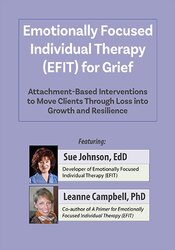Attachment-Focused Interventions for Grief

Grief can be an unpredictable shock to your client's attachment system, causing them to become dysregulated or shut down in the days, weeks, months, and years ahead.
Most therapeutic approaches focus on creating a supportive space and provide some basic suggestions for coping, leaving both you and your clients feeling like progress is painfully slow, if progress is even being made.
But what if you could help your clients shift into a state of emotional balance that allows them to process their grief, relieve emotional pain and find meaning in their lives again from their very first session?
That's what Emotionally Focused Individual Therapy (EFIT) is designed to do.
Dr. Leanne Campbell, ICEEFT (International Centre for Excellent in EFT) certified trainer, shares what makes EFIT such an effective approach for treating grief.
Attachment theory and science provide us with a framework for understanding emotional regulation and personal and social adjustment in general, as well as responses to any kind of threat to our emotional bonds like prolonged separation or loss.
Key from an attachment point of view is the assumption that we are wired for connection. We have an innate psychobiological system that moves us to seek proximity with central attachment figures during times of need.
When those others are accessible, responsive, and engaged, our nervous systems are soothed, and we can continue to explore, learn, and grow in this "safe haven" of connection. When those others are not available, and especially when they have been heavily relied upon, our propensity is to protest and to respond with a host of emotional reactions including anxiety, sadness, anger, and a longing for our loved one.
In the case of loss to death, such reactions are likely to be most pronounced when the loss involves a key pillar of security (e.g., a parent, caregiver, or spouse). From an attachment point of view, disorganization and disorientation in the face of loss are not only likely, but also a natural response, consistent with our hard-wired psychobiological system.
Attachment theorists and scientists talk about a "hierarchy of attachment." In childhood, key figures are parents or caregivers. In adulthood, key figures often involve romantic relationships. According to John Bowlby, the father of attachment theory, when facing the loss of a close relationship partner, a sense of attachment security is restored with the reorganization (or "editing") of the attachment hierarchy. The lost loved one can then remain significant as a "continuing bond," but space can be made in higher ranks of the hierarchy for other significant attachment figures that can be relied upon in times of need.
Post-loss reorganization involves two psychological processes: (a) accepting the loss, returning to everyday activities, and forming new attachments or upgrading old ones; and (b) maintaining a "continuing bond" with the lost loved one while also strengthening bonds with available attachment figures.
An attachment-based model of therapy, EFIT is uniquely suited to not only join clients in this organic process but also help them identify (as needed) any blocks to post-loss reorganization.
From an attachment point of view, our sense of self is constructed and evolves in our most important relationships. When one such relationship is lost, and especially in cases of sudden and traumatic loss, this naturally shakes our foundation, rocks our emotional balance, and leaves us feeling uncertain of our identity and our place in the world. In most cases, people will move with and through the emotion associated with such a loss, but in some cases, they will get stuck.
Standing on the shoulders of attachment theory and science, hundreds of studies, and now over thirty years of research involving EFT with couples, EFIT uses this same theoretical and empirical foundation to make sense of clients’ experiences of loss. We also use the same interventions we have used with couples for years to help our clients move through loss and grief into ongoing growth and resilience.
Jane arrived for an initial session feeling lost, angry, and depressed after the loss of her husband of many years. Friends and family thought she should be further along...that she should have moved on. It had been over two years.
As I joined with Jane and heard more about her own story of love and loss, it soon became clear that she had left herself behind in the wake of her husband’s death to serious illness. She had put her own needs and emotions aside to be there for her husband and their sons as they said their final goodbyes.
Once this block to her own grief had been identified and she was able to move with and through the emotions associated with key moments surrounding the loss, she truly was able to move forward and continue living fully again.
The physical pain of loss and longing were replaced with joy.
Moments of anger and resentment surrounding the void in her life shifted to gratitude as the rich landscape of their life together brightened.
Opportunities to connect "symbolically" with her husband and share in important moments began to happen often and with ease.
Bonus: see Leanne Campbell and EFT developer Sue Johnson in conversation about the power of EFIT in this exclusive interview: Attachment-Based Interventions for Grief.
Most therapeutic approaches focus on creating a supportive space and provide some basic suggestions for coping, leaving both you and your clients feeling like progress is painfully slow, if progress is even being made.
But what if you could help your clients shift into a state of emotional balance that allows them to process their grief, relieve emotional pain and find meaning in their lives again from their very first session?
That's what Emotionally Focused Individual Therapy (EFIT) is designed to do.
Dr. Leanne Campbell, ICEEFT (International Centre for Excellent in EFT) certified trainer, shares what makes EFIT such an effective approach for treating grief.
What does attachment theory tell us about how people react to loss?
Attachment theory and science provide us with a framework for understanding emotional regulation and personal and social adjustment in general, as well as responses to any kind of threat to our emotional bonds like prolonged separation or loss.
Key from an attachment point of view is the assumption that we are wired for connection. We have an innate psychobiological system that moves us to seek proximity with central attachment figures during times of need.
When those others are accessible, responsive, and engaged, our nervous systems are soothed, and we can continue to explore, learn, and grow in this "safe haven" of connection. When those others are not available, and especially when they have been heavily relied upon, our propensity is to protest and to respond with a host of emotional reactions including anxiety, sadness, anger, and a longing for our loved one.
In the case of loss to death, such reactions are likely to be most pronounced when the loss involves a key pillar of security (e.g., a parent, caregiver, or spouse). From an attachment point of view, disorganization and disorientation in the face of loss are not only likely, but also a natural response, consistent with our hard-wired psychobiological system.
How do we work through grief from an attachment perspective?
Attachment theorists and scientists talk about a "hierarchy of attachment." In childhood, key figures are parents or caregivers. In adulthood, key figures often involve romantic relationships. According to John Bowlby, the father of attachment theory, when facing the loss of a close relationship partner, a sense of attachment security is restored with the reorganization (or "editing") of the attachment hierarchy. The lost loved one can then remain significant as a "continuing bond," but space can be made in higher ranks of the hierarchy for other significant attachment figures that can be relied upon in times of need.
Post-loss reorganization involves two psychological processes: (a) accepting the loss, returning to everyday activities, and forming new attachments or upgrading old ones; and (b) maintaining a "continuing bond" with the lost loved one while also strengthening bonds with available attachment figures.
Can you tell us how EFIT is uniquely suited to help clients who are grieving?
An attachment-based model of therapy, EFIT is uniquely suited to not only join clients in this organic process but also help them identify (as needed) any blocks to post-loss reorganization.
From an attachment point of view, our sense of self is constructed and evolves in our most important relationships. When one such relationship is lost, and especially in cases of sudden and traumatic loss, this naturally shakes our foundation, rocks our emotional balance, and leaves us feeling uncertain of our identity and our place in the world. In most cases, people will move with and through the emotion associated with such a loss, but in some cases, they will get stuck.
Standing on the shoulders of attachment theory and science, hundreds of studies, and now over thirty years of research involving EFT with couples, EFIT uses this same theoretical and empirical foundation to make sense of clients’ experiences of loss. We also use the same interventions we have used with couples for years to help our clients move through loss and grief into ongoing growth and resilience.
Tell us about a case where EFIT really helped someone work through their grief.
Jane arrived for an initial session feeling lost, angry, and depressed after the loss of her husband of many years. Friends and family thought she should be further along...that she should have moved on. It had been over two years.
As I joined with Jane and heard more about her own story of love and loss, it soon became clear that she had left herself behind in the wake of her husband’s death to serious illness. She had put her own needs and emotions aside to be there for her husband and their sons as they said their final goodbyes.
Once this block to her own grief had been identified and she was able to move with and through the emotions associated with key moments surrounding the loss, she truly was able to move forward and continue living fully again.
The physical pain of loss and longing were replaced with joy.
Moments of anger and resentment surrounding the void in her life shifted to gratitude as the rich landscape of their life together brightened.
Opportunities to connect "symbolically" with her husband and share in important moments began to happen often and with ease.
Bonus: see Leanne Campbell and EFT developer Sue Johnson in conversation about the power of EFIT in this exclusive interview: Attachment-Based Interventions for Grief.
Discover Attachment-Based Interventions to Move Clients Through Loss into Growth and Resilience

Emotionally Focused Individual Therapy (EFIT) offers a dependable map to tune into your clients’ emotions as they grapple with the impact of loss. EFIT takes you to the heart of the matter with clear interventions that will reliably shape transformational emotional moments for your clients in every session.
During this workshop, Dr. Sue Johnson and Dr. Leanne Campbell will give you a blueprint to use with your clients struggling with loss – including anticipatory loss and traumatic loss. You’ll be ready to:
Save your seat now - harness the power of emotions and integrate attachment theory into your practice with clients struggling in the aftermath of loss.
During this workshop, Dr. Sue Johnson and Dr. Leanne Campbell will give you a blueprint to use with your clients struggling with loss – including anticipatory loss and traumatic loss. You’ll be ready to:
- Conduct process-oriented assessments that frame grief from an attachment perspective
- Utilize a proven set of macro and micro interventions that respond to the core longings, needs, and vulnerabilities your grieving clients are experiencing
- Resolve symptoms, transform trauma, and move clients into the type of full, flexible aliveness that promotes resilience and growth
Save your seat now - harness the power of emotions and integrate attachment theory into your practice with clients struggling in the aftermath of loss.





